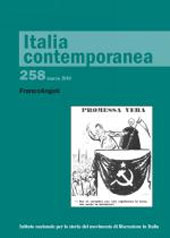Per una modernizzazione alternativa. Il ruolo del cinema nella politica culturale del Partito comunista italiano (1949-1965)
112-136 p.
Attraverso lo spoglio delle principali riviste del Pci ("il Contemporaneo", "Rinascita", "Vie Nuove") e la consultazione di alcune fonti d'archivio, l'articolo ricostruisce le pratiche discorsive dei comunisti italiani intorno al tema del cinematografo tra la fine degli anni Quaranta e la metà degli anni Sessanta, ovvero nel periodo compreso fra le due principali leggi di regolamentazione del settore. Decostruendo l'immagine storiografica di un partito incapace di leggere le trasformazioni indotte dall'ondata di modernizzazione neocapitalistica, l'articolo dimostra come il cinema abbia permesso al Pci di Togliatti di mettere in campo un coerente e articolato piano di radicamento nelle infrastrutture culturali ed economiche del Paese negli anni della Guerra fredda. [Testo dell'editore]
Through the examination of the main magazines of the Italian Communist Party ("il Contemporaneo", "Rinascita", "Vie Nuove") and the analysis of archival sources, the article explores the discursive practices of the Italian communists regarding cinema between the end of the Forties and the mid-Sixties, thus covering the period between the two main laws regulating the sector. The article deconstructs the historiographical image of the party as incapable of interpreting the transformations induced by the wave of neo-capitalist modernization. Moreover, it aims to demonstrate how cinema allowed Togliatti's party to implement a coherent and nuanced plan of putting down deep roots in the cultural and economic infrastructure of the country during the Cold War years. [Publisher's text]
Is part of
Italia contemporanea : 306, 3, 2024-
Articles from the same issue (available individually)
-
Information
ISSN: 2036-4555
KEYWORDS
- Pci, cinema, politica culturale, censura, neorealismo, Hollywood
- Pci, cinema, cultural politics, censorship, neorealism, Hollywood


